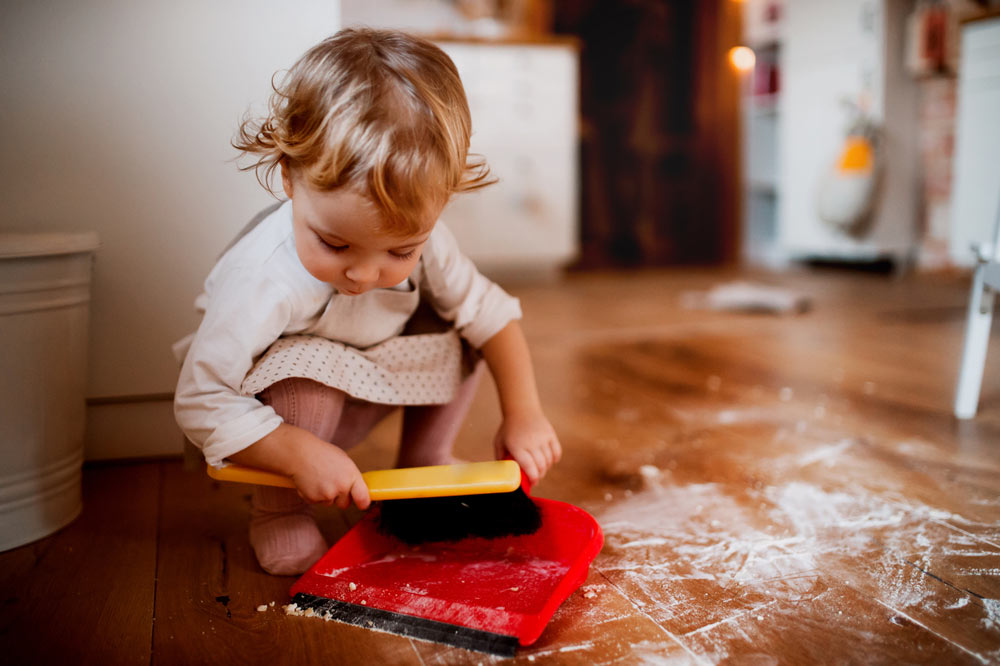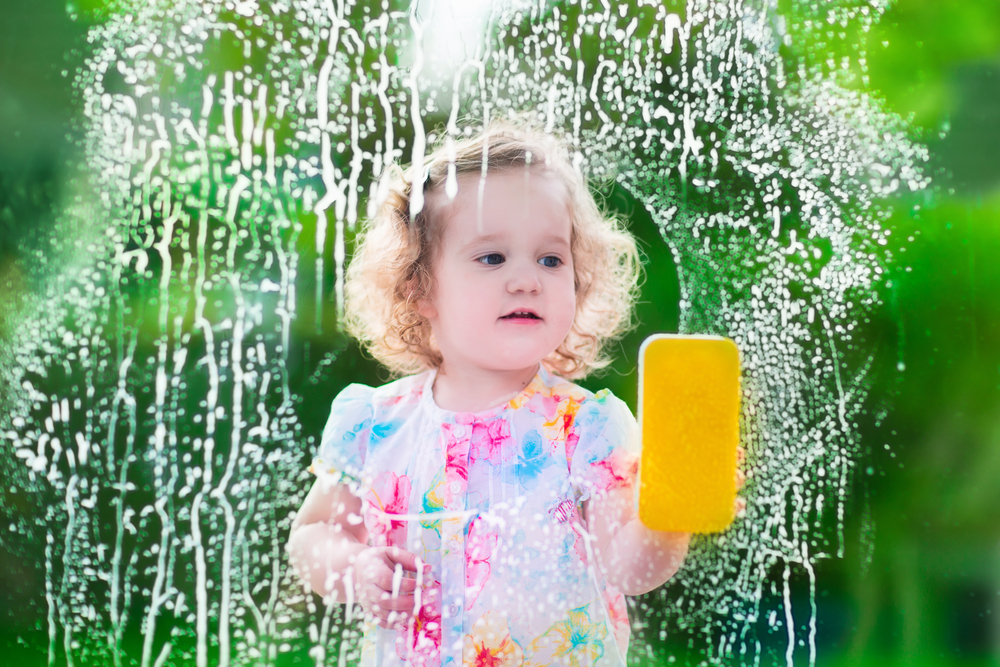Turning Everyday Household Activities into Learning Opportunities
Written by Carly Tzanos | Occupational Therapist
Tags: BondingGrowth and DevelopmentStimulation
With everyone being at home at the moment, there is probably a fair amount of tripping over one another in your house! Simple tasks such as food preparation, doing laundry and cleaning probably seem like a big effort, especially if you have a baby or toddler “assisting” you!
Perhaps a shift of focus can help…. These household activities hold a wealth of developmental learning opportunities for your little one if you are willing to set aside a little more time for them and accept that the end result may be just a little less perfectly done.
Let’s take a look at some routine household chores and how your little one can learn and develop simply by you being purposeful about their involvement in them:
Learning with Laundry
Loading the machine
Start by letting your little one help you push the laundry basket to the washing machine and load the clothes in. This pushing is important sensory food for their body position sense.
If she can manage to pour the powder/liquid detergent into the drawer (even with your help), then let her do that too. Help her to use both hands together in a smooth and coordinated way.
Once the laundry is done, get your little helper to take the clothes out and push the now rather heavy basket as far as she can towards the washing line.
Hanging on the line
If you can, string up a low washing line (perhaps over the bath) or let your child use a clothes horse. These are great to peg up the smaller items like socks on “her” line.
You can begin by placing your hands over hers to start so that she can get used to holding the sock with one hand while opening and pegging the peg with the other.
If this is a little tricky, alternate holding and pegging so you can hold while your child pegs and she can hold while you peg.
This bilateral task will help your child learn how to cut later on in school.
Matching and folding
Once the washing is dry, let your little one assist you in matching socks and placing items into piles according to who they belong to or according to colour.
This is an excellent opportunity to talk about colour, size and then attempt sorting from biggest to smallest.
These perceptual tasks will help your little one with maths later on.
Not laundry day? Try this fun indoor laundry activity:
Cut t-shirt, pants or sock shapes out of paper and help your child to hang her “teddy’s clothes” on a makeshift washing line.
Make it easier for her to peg the “clothes” on the line by using stiff cardboard, pegging one side of each item or folding the tip of the “clothes” over the “line” so that they hang before she has to put a peg on.
Clever Cleaning
Dishwashing
Getting soapy and muddy is important for touch exploration and washing dishes looks so much more fun when you are little, and you see all those bubbles!
Get a big plastic tub and add a little warm water and soap into it. Put this “washing up bowl” on the floor for your enthusiastic helper and let him wash some of the plastic items as you tackle the breakable items.
Remember to put a towel or two down beforehand to make cleanup quick and easy once he’s done!
Sweeping
When you sweep, get your child to help out by using the brush from the dustpan. Next, swap over, and he can have a turn with the big broom while you sweep up the pile of dirt.
This activity will encourage your child to cross his imaginary midline - a task that will help hand dominance and bilateral hand use develop.
No dust to sweep? You can also “make a mess” with paper scraps, plastic beads, a shredded piece of old tinsel etc. so your little one can sweep and re-sweep the “mess”.

Windows and doors
Get your toddler to help you clean the shower door. Make up a non-harmful mixture (e.g. vinegar and water) and put it in a spray bottle. Show your little one how to spray it onto the shower door and then wipe and clean with a cloth. You may have to get the spots he misses, but he will love spraying, wiping and rinsing.
The best part for this activity is the mess is contained in the shower! The spray bottle will encourage finger strengthening and again using the spray bottle and the cloth encourages loads of bilateral hand use and crossing of the imaginary midline.

Kitchen Skills
Food preparation
If you have a baby who is not yet mobile, she can still enjoy food prep time with you! Let her sit in a supportive chair and explain your actions as you prepare food.
Get down to her level when you can and show her what you are doing. If your little one is a bit older and wants to help with food prep, then you can allow her to pour, mix and dish as she is able.
A lower kiddies table near the kitchen or a high chair with a big tray table could also be used for her to help. She could tip salad ingredients into a big bowl, stir milk into mashed potatoes or place snacks into bowls.
Kitchen “tools” are an excellent source of entertainment and learning. Hand over child-friendly utensils such as small tongs, spatulas, pots and lids and your little one can copy what you are doing from a safe distance.
Smelling ingredients
Your little one’s sense of smell can also be stimulated in the kitchen. Let her smell the ingredients that you add (remembering that her sense of smell is better than yours, so you don’t need to get too close to her nose!).
Sorting and matching
Sorting and matching activities are easy to do in the kitchen. While you are cooking, try some of these to keep your clever little one busy:
Find a container with divisions in it (an ice block tray, egg box, small plastic bowls) and some objects to sort (dried fruits, Lego blocks, toy bugs, toy soldiers and so on).
Encourage your little one to put the same type/colour objects into one division and another type/colour into another division, and so on until all the objects are packed into the container.
There is a wealth of learning and development in these simple everyday activities that build skills that form the basis of what your little one will need for formal learning at school one day. These include:
- development of fine and gross motor skills,
- improving vocabulary,
- maturing the sensory system
- encouraging creativity
- socialising
- learning of basic concepts and
- developing his ability to reason and sequence through tasks.
The learning journey to your child’s full potential starts at home! As an occupational therapist and mom of 2, having them join in with household tasks has afforded them learning opportunities, made for a more peaceful home environment, provided plenty of hilarious moments and hopefully will be setting them up for being helpful, independent and well-adjusted adults.
Your Lockdown Challenge
Being in lockdown has pushed most of us to our limits of patience and endurance - but it has also afforded us opportunities to engage with our children in ways that we may not have had the time or thought to do so before. So, why not give these activities a go, you may be surprised at how much fun you can have together while guaranteeing some excellent learning along the way.
Before you start:
stop and think through the task,
see how your little one can help,
gather what you will need,
decide to be patient and encouraging,
don’t expect perfection,
laugh when it doesn’t go as you thought and
decide to do another task together tomorrow!
Share this
- 0
- 0
Related Posts
Have you tried the Nubabi Free Trial?
Get unlimited access to Your Parenting Toolkit for 2 weeks for free!
Track, Boost, Explore and Capture your child's growth and development.
Available on both mobile and web.


